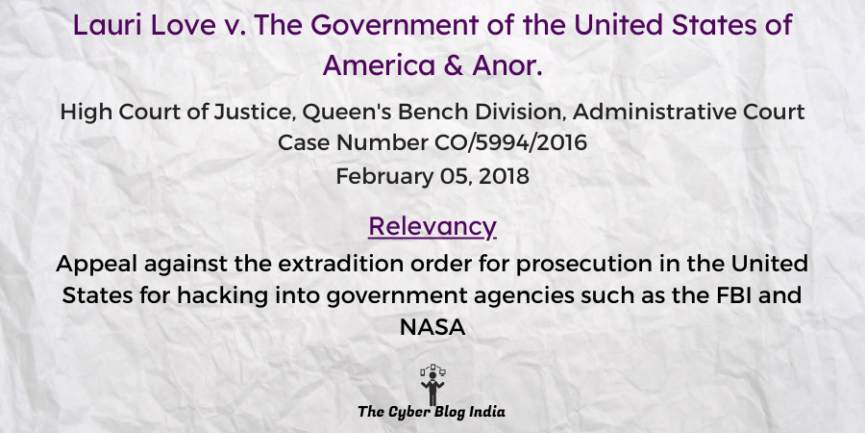Lauri Love v. The Government of the United States of America & Anor.

Lauri Love v. The Government of the United States of America & Anor.
[2018] EWHC 172 (Admin)
In the High Court of Justice, Queen’s Bench Division, Administrative Court
Case Number CO/5994/2016
Before the Lord Chief Justice Burnett and Justice Ouseley
Decided on February 05, 2018
Relevancy of the Case: Appeal against the extradition order for prosecution in the United States for hacking into government agencies such as the FBI and NASA
Statutes and Provisions Involved
- The Extradition Act 2003 (Section 76, 79, 83)
- The Crime and Courts Act 2003
- The European Convention on Human Rights (Article 3)
- The Computer Misuse Act 1990
Relevant Facts of the Case
- Between October 2012 and October 2013, Love and others made a series of cyber attacks on the the computer networks of private companies and US government agencies. They stole and publicly disseminated confidential information found on the hacked networks, including personally identifiable information. Love is a UK citizen.
- From 2013 to 2014, grand juries in three different federal districts in the United States indicted him for multiple counts of conspiracy and computer hacking.
- In 2014, the Crown Prosecution Service (CPS) decided to allow the US indictments to take priority over a UK prosecution.
- A District Judge in Westminster ordered his extradition to the US for the trial. He has appealed against this judgement.
Prominent Arguments by the Counsels
- The appellant’s counsel contended that Love should be tried in the UK, his home country. His mental condition, including Asperger syndrome, should exclude him from extradition. In this case, extradition will not be in the interests of justice. He might commit suicide if the court decides to send him to the US.
- The respondent’s counsel claimed that the mental health conditions were merely an excuse. The counsel emphasised the seriousness of allegations, which involved hacking into US government websites. The appellant stole data from agencies such as the US Army, NASA, and the FBI.
Opinion of the Bench
- The District Judge correctly treated US as the place where most of the harm or loss took place. There was a likelihood of a greater degree of inconvenience to individual witnesses for a trial in the UK.
- However, there was a significant risk of the appellant’s mental health deterioration if the trial was to take place in the US.
Final Decision
- The court allowed the appeal, while directing the CPS to prosecute the appellant in the UK with the help of US authorities.
Adyasha Sahoo, an undergraduate student at the Institute of Law, Nirma University Ahmedabad, Arnav Kaman, an undergraduate student at Rajiv Gandhi National University of Law, Punjab, and Khilansha Mukhija, an undergraduate student at the Institute of Law, Nirma University Ahmedabad, prepared this case summary during their internship with The Cyber Blog India in January/February 2024.
